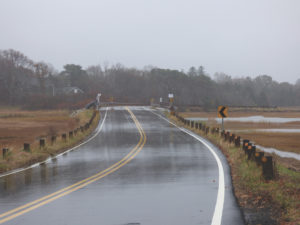
EASTHAM — If a severe storm or flood hit the Outer Cape forcing residents to evacuate, it would cause a major traffic backup.
Route 6 is the main evacuation route to Orleans and beyond. But what if the Orleans Rotary were under water?
Drivers could try the back roads through Eastham, but that would require travelling down Bridge Road, which is often the first road in town to flood when a storm hits. If the rotary is impassable, chances are Bridge Road will be, too.
At forums over the past year, Eastham residents have expressed concerns about infrastructure at low elevation, the lack of a major supermarket on the Outer Cape except for Provincetown, and the distance to Cape Cod Hospital.
Eastham is updating its local hazard mitigation plan and looking to publish a final draft in 2020. Provincetown published its hazard mitigation plan in 2016, while Truro and Wellfleet published plans in 2017.
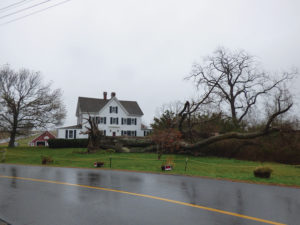
The purpose of the plan is to safeguard the community from the effects of storms and natural hazards by increasing its economic, social, and environmental resiliency, according to the town website.
Eastham residents can complete an online survey to let planners know which issues they think should take priority during hazard mitigation planning. The survey will be available through December and can be found at eastham-ma.gov/home/news/hazard-mitigation-plan-update-public-survey.
A public hearing on the draft plan is scheduled for January 2020. After that hearing the select board must endorse the plan and submit it to the Mass. Emergency Management Agency (MEMA) and the Federal Emergency Management Agency (FEMA) for approval. If all goes according to plan, the town will adopt the plan in March 2020.
Like other towns across the Cape, Eastham is a part of the state’s Municipal Vulnerability Preparedness (MVP) program, which provides support for communities to mitigate the effects of climate change and natural hazards. The town received a $30,000 grant from the state for a community resiliency planning process and has partnered with the Cape Cod Commission, Cape Cod Cooperative Extension, and Woods Hole Sea Grant to work on planning, according to the town website.
The town’s MVP plan was approved by the state and published in June, and Eastham has been designated as an MVP Community, meaning it is eligible for more state funding.
The hazard mitigation plan is being completed in conjunction with the MVP initiative.
The process of developing comprehensive plans will educate local residents about the dangers posed by natural hazards and encourage citizens to develop a strategy to reduce or eliminate potential risks, allowing the community to recover quickly after storms, according to Town Planner Paul Lagg.
The MVP program focuses more on climate resiliency and is tied to state grants, while the hazard mitigation plan takes a broader look at all the possible natural hazards and is tied to federal grants, according to Lagg.
“We’re trying to get awareness out there and get different stakeholders to offer different perspectives,” he said.
Separately, Outer Cape towns are also working in collaboration on an Outer Cape Regional Shoreline Management Project.
Flooding, erosion, high winds, hurricanes, and sea level rise are the most immediate hazards Eastham now faces. Residents at workshops over the last year said they were most concerned with low-lying infrastructure for transportation, such as the rotary and Bridge Road. These areas saw increased flooding during storms in the winter of 2018-19, and a flash flood in August 2018 caused Bridge Road to be shut down for a few days.
Lagg said town officials plan to work on local bylaws and regulations so that redevelopment or new development of properties take account of sea level rise and other environmental factors.
The median age of Eastham residents is now 65 years. The town has numerous narrow private roads, creating risky conditions for accessibility and mobility.
The town does use Nauset Regional High School as a shelter and the library as a warming station. A Code RED system provides emergency notifications for residents who are signed up, and the fire department has a high-water vehicle that can access flooded areas and narrow roads to help residents get out of their homes in emergencies.
For more information, visit easthammvp.weebly.com.
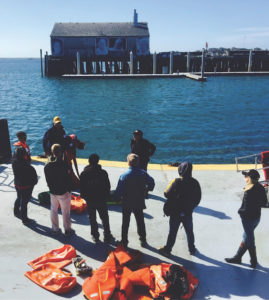

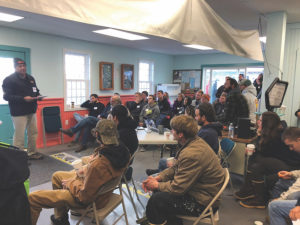

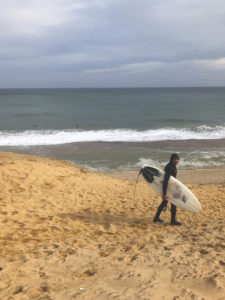
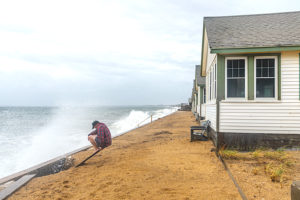


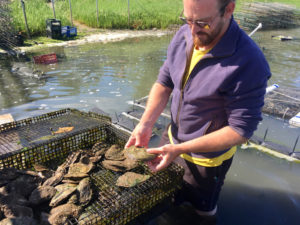

U.S. Attorney Andrew Lelling has questions for towns that have issued host community agreements to marijuana businesses.
Provincetown, Wellfleet, and Eastham town administrators all received subpoenas last month ordering them to produce documents, emails, and any other correspondence associated with the agreements.
They must appear at the John Joseph Moakley U.S. Courthouse to testify before a federal grand jury, according to the subpoena issued on Oct. 8 to Eastham Town Administrator Jacqueline Beebe. The notice commands her to be at the courthouse at 10 a.m. on Nov. 14.
Rae Ann Palmer, town manager in Truro, which has given a host agreement to a cannabis farming group, the High Dune Craft Cooperative, had not received one as of Tuesday, she said. But Wellfleet Town Administrator Dan Hoort and Provincetown Acting Town Manager David Gardner both have, they said.
No one knows why exactly. Katherine Laughman, who represents several towns including Eastham for KP Law, said she could not comment on the subpoenas because federal grand jury investigations are secret.
Lelling’s interest has something to do with the host community agreements, which are the critical first approvals marijuana businesses must get from towns before they can seek state licenses. In the case of medical marijuana dispensaries the agreements are called letters of non–opposition.
The subpoenas call for all written, electronic, or other records relating to any business that has applied for a marijuana (adult use or medical) license.
Officials must include “every iteration and draft version of the agreement,” the orders state. The U.S. attorney wants voicemail recordings and everything pertaining to public deliberations. And he has demanded all records that identify current or former town employees who have been hired by or received payment from a marijuana business applicant.
Gardner said he suspects the subpoenas have to do with the investigation and Sept. 6 arrest of Jasiel F. Correia II, the mayor of Fall River, whom the U.S. Dept. of Justice has charged with “extorting marijuana vendors for hundreds of thousands of dollars in bribes,” according to the U.S. attorney’s public announcement. Lelling’s office, which is prosecuting Correia, states that the bribes range from $100,000 to $250,000 in cash. In exchange Correia agreed to issue non-opposition letters and community host agreements to marijuana business owners, according to Lelling’s office.
Correia, 27, issued at least 14 non-opposition letters for marijuana businesses to operate in Fall River, including two for his current girlfriend’s brother. And when the Fall River City Council passed an ordinance to limit the number of marijuana licenses in the city to 20 percent of the number of off-premises liquor licenses or 11, whichever is greater, Correia vetoed the order, claiming that it would eliminate competition, Lelling’s announcement stated.
Attorney Michael Fee, a Truro resident who represented the High Dune Craft Cooperative in obtaining host community agreements from Truro and Wellfleet, said Gardner is probably correct. The host community agreements have been controversial from the start, he said.
“I can only speculate — I don’t know what Lelling is thinking,” Fee said. “But he’s probably thinking of the abuses unearthed by the Fall River mayor. These are egregious violations of the public trust.”
The host agreements give communities leverage over marijuana businesses. Towns are allowed by law to ask that up to three percent of sales revenue in the first five years be given to the towns as “community impact fees,” said Fee.
There is a clause in the law stating that community impact fees must correlate with the actual cost burden a new marijuana business places on police, fire, and other municipal services.
How do you judge such an impact with a completely new industry? Fee asked.
“My feeling is some cities and towns feel they can interpret this broadly,” Fee said. “So it’s an environment that’s ripe for unscrupulous public officials.”
Towns can also ask for other payments, as well as donations in kind, in the host agreements. These agreements are all public documents.
In Provincetown, for example — which has host agreements with seven pot purveyors — the community impact fee for all vendors is three percent of gross sales. Plus the cannabis vendors must give a discount to low-income medical marijuana card holders and donate 100 hours of community service activities. Each applicant also agreed to make an annual charitable contribution of up to one percent of gross revenues to a fund established to provide grants to social service agencies.
While host community agreements may have some controversial aspects that are open to interpretation, Fee thinks U.S. Attorney Lelling is looking for major corruption, such as what allegedly occurred in Fall River.
It’s highly unlikely Lelling will find anything like that on the Outer Cape, Fee said, adding that the agreements with Truro and Wellfleet on which he advised clients are completely appropriate.
In Provincetown, Gardner said the seven marijuana businesses that have host agreements are still waiting for final state approval. The furthest along, Curaleaf at 170 Commercial St., will probably open in January.
Wellfleet has five host community agreements for retail sales and one for cultivation, though none has final state approval.
Truro has signed only with the High Dune Craft Cooperative.
Eastham has two agreements, one for retail, one for both retail and cultivation.